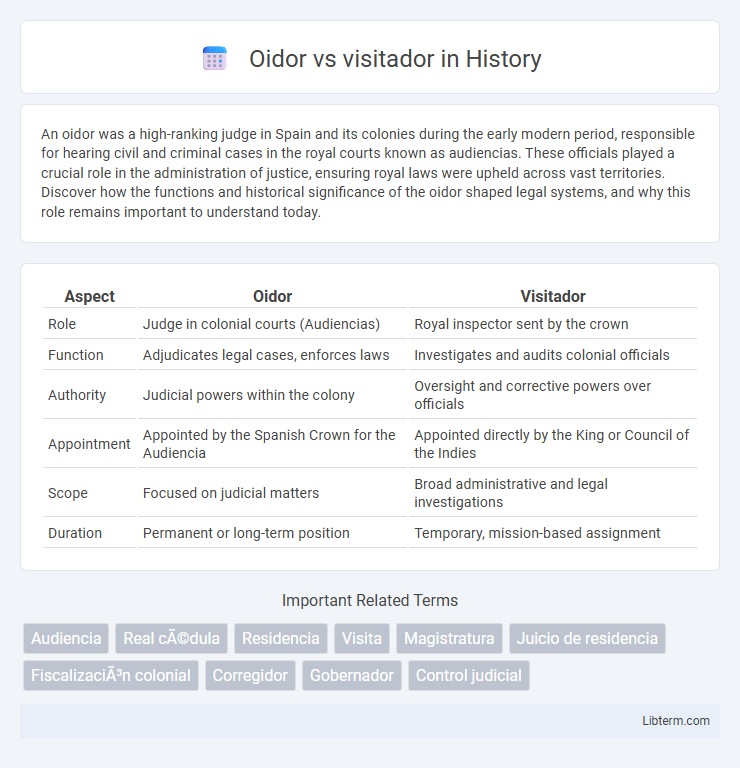An oidor was a high-ranking judge in Spain and its colonies during the early modern period, responsible for hearing civil and criminal cases in the royal courts known as audiencias. These officials played a crucial role in the administration of justice, ensuring royal laws were upheld across vast territories. Discover how the functions and historical significance of the oidor shaped legal systems, and why this role remains important to understand today.
Table of Comparison
| Aspect | Oidor | Visitador |
|---|---|---|
| Role | Judge in colonial courts (Audiencias) | Royal inspector sent by the crown |
| Function | Adjudicates legal cases, enforces laws | Investigates and audits colonial officials |
| Authority | Judicial powers within the colony | Oversight and corrective powers over officials |
| Appointment | Appointed by the Spanish Crown for the Audiencia | Appointed directly by the King or Council of the Indies |
| Scope | Focused on judicial matters | Broad administrative and legal investigations |
| Duration | Permanent or long-term position | Temporary, mission-based assignment |
Oidor vs Visitador: Key Differences
Oidor and Visitador are distinct roles within the Spanish colonial administrative system, with Oidores serving as judges in the audiencia responsible for judicial and legal matters, while Visitadores were royal inspectors sent to audit and oversee colonial officials and governance. The Oidor's primary function involved adjudicating civil and criminal cases, ensuring justice in the territories, whereas the Visitador held investigatory powers to reform abuses, assess administrative efficiency, and report directly to the Crown. Understanding the key differences between Oidor and Visitador is crucial for comprehending the checks and balances in the colonial governance system of the Spanish Empire.
Historical Background of Oidores and Visitadores
Oidores were judicial officials in the Spanish colonial administration responsible for hearing and adjudicating cases within the audiencia courts, established in the 16th century to govern and administer justice in the Americas. Visitadores were royal inspectors sent by the Spanish Crown to investigate and oversee colonial officials and institutions, ensuring compliance with laws and royal policies during the same period. Both roles were integral to maintaining royal authority and legal order in Spain's overseas territories.
Roles and Responsibilities: Oidor Explained
The Oidor serves as a high-ranking judicial official in Spanish colonial administration, primarily responsible for hearing and adjudicating legal cases within the audiencia. Their role encompasses overseeing civil and criminal matters, ensuring justice is administered according to colonial laws, and maintaining legal order in the territories under their jurisdiction. Unlike the Visitador, whose mandate focuses on auditing and inspecting administrative conduct, the Oidor's duties center on judicial decision-making and safeguarding the legal framework within the colonial government.
Duties and Powers: Visitador in Colonial Administration
In colonial administration, the visitador held investigative and supervisory duties, tasked with inspecting governmental and judicial officials to enforce royal policies and ensure administrative integrity. Unlike the oidor, who primarily adjudicated legal cases within the audiencia, the visitador wielded broader oversight powers, including the authority to recommend reforms and report directly to the Crown on abuses or corruption. This role was crucial in maintaining centralized control, preventing malfeasance, and promoting efficient governance in colonial territories.
Appointment Process: How Oidores and Visitadores Were Chosen
Oidores were appointed by the Spanish Crown through royal decrees, often selected from experienced lawyers or judges to serve in the Audiencias, the colonial courts. Visitadores were typically chosen directly by the Council of the Indies or the monarch for specific, temporary investigative missions, focusing on auditing and inspecting colonial officials and administrations. The appointment of visitadores was more ad hoc and situational, reflecting urgent needs for oversight or reform in the colonies.
Jurisdiction and Authority: Comparing Oidor and Visitador
Oidor possessed judicial jurisdiction, acting as a judge in colonial courts with authority to hear and decide cases, enforce laws, and administer justice within specific regions. Visitador held extraordinary inspection authority, tasked by the crown to investigate administrative conduct, enforce royal mandates, and audit local officials, often overriding local jurisdiction for reform and control. The Oidor's power was primarily judicial and regional, while the Visitador exercised supervisory and corrective authority with broad, sometimes empire-wide jurisdiction.
Impact of Oidores and Visitadores on Colonial Justice
Oidores significantly shaped colonial justice by serving as judges in audiencia courts, ensuring legal consistency and protecting settlers' rights under Spanish law. Visitadores exercised oversight by investigating corruption and abuses committed by colonial officials, thereby promoting administrative accountability and reform. Both roles were crucial in maintaining judicial integrity and limiting the excesses of colonial administrators.
Famous Oidores and Visitadores in History
Oidores were judicial officers in the Spanish Empire responsible for hearing and deciding cases, with notable figures such as Juan de Ovando and Alonso de Maldonado recognized for their roles in colonial administration. Visitadores were royal inspectors sent to audit and investigate colonial officials and institutions, with famous visitadores like Jose de Galvez, who reformed New Spain's administration in the 18th century. The distinct roles of oidores and visitadores significantly shaped the governance and legal systems within Spain's vast overseas territories.
Case Studies: Oidor vs Visitador in Colonial Conflicts
Oidores and visitadores played distinct roles in colonial governance, with oidores serving as judicial officials handling legal disputes while visitadores acted as royal inspectors overseeing administration and investigating corruption. Case studies from the Spanish colonial era reveal conflicts where oidores challenged visitadores' authority, notably during investigations into local magistrates, exposing tensions between judicial independence and executive oversight. These clashes often resulted in power struggles that influenced colonial legal reforms and administrative practices across territories in the Americas.
Legacy and Influence of Oidores and Visitadores Today
Oidores, originally Spanish colonial judges, established foundational legal principles that influenced modern judicial systems in Latin America. Visitadores, as royal inspectors, set precedents for government oversight and anti-corruption measures still reflected in contemporary administrative practices. The lasting legacy of both roles underscores their crucial impact on legal accountability and governance structures today.
Oidor Infographic

 libterm.com
libterm.com